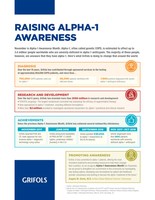BARCELONA, Spain, Nov. 1, 2018 /PRNewswire/ -- Alpha-1 awareness matters. Alpha-1 (alpha-1- antitrypsin deficiency) is a genetic condition that may result in serious, chronic lung disease in adults, including an increased risk of developing emphysema, and is the most commonly known genetic risk factor for chronic obstructive pulmonary disease (COPD). It may also result in liver disease for all ages, such as cirrhosis and liver cancer. It affects approximately 100,000 people in the U.S., but it is estimated that less than 10 percent of people living with alpha-1 have been properly diagnosed, even though a simple blood test will detect the condition.1 Grifols is a leading global producer of plasma-derived medicines and a committed partner to the alpha-1 community, dedicated to improving patients' lives for 30 years.
Alpha-1 occurs when there is a lack of a protein in the blood called alpha-1 antitrypsin, or AAT. AAT is primarily produced in the liver and protects the lungs from infection and inhaled irritants. Alpha-1 is commonly misdiagnosed as asthma or smoking-related COPD. Left untreated, alpha-1 can lead to liver and/or lung disease, which may be manifested as jaundice, liver failure, shortness of breath, chronic coughing due to COPD, chronic bronchitis, bronchiectasis, or severe asthma.
November is Alpha-1 Awareness Month, and Grifols is proud to share its efforts to further increase alpha-1 diagnosis rates and expand treatment options.
To learn more about alpha-1, testing and diagnosis, please visit www.thinkalpha1.com.
1. Alpha-1 Foundation. Questions and answers about alpha-1 antitrypsin deficiency (alpha-1). http://www.alpha1.org/Portals/0/Documents/Alpha-1-Questions-and-Answers.pdf. Accessed October 29, 2018.
Important Safety Information
PROLASTIN®-C LIQUID is an alpha1-proteinase inhibitor (human) (alpha1-PI) indicated for chronic augmentation and maintenance therapy in adults with clinical evidence of emphysema due to severe hereditary deficiency of alpha1-PI (alpha1-antitrypsin deficiency).
Limitations of Use
- The effect of augmentation therapy with any alpha1-PI, including PROLASTIN-C LIQUID, on pulmonary exacerbations and on the progression of emphysema in alpha1-PI deficiency has not been conclusively demonstrated in randomized, controlled clinical trials
- Clinical data demonstrating the long-term effects of chronic augmentation or maintenance therapy with PROLASTIN-C LIQUID are not available
- PROLASTIN-C LIQUID is not indicated as therapy for lung disease in patients in whom severe alpha1-PI deficiency has not been established
PROLASTIN-C LIQUID is contraindicated in immunoglobulin A (IgA)-deficient patients with antibodies against IgA or patients with a history of anaphylaxis or other severe systemic reaction to alpha1-PI products.
Hypersensitivity reactions, including anaphylaxis, may occur. Monitor vital signs and observe the patient carefully throughout the infusion. If hypersensitivity symptoms occur, promptly stop PROLASTIN-C LIQUID infusion and begin appropriate therapy.
Because PROLASTIN-C LIQUID is made from human plasma, it may carry a risk of transmitting infectious agents, eg, viruses, the variant Creutzfeldt-Jakob disease (vCJD) agent, and, theoretically, the Creutzfeldt-Jakob disease (CJD) agent. This also applies to unknown or emerging viruses and other pathogens.
The most common adverse reactions during PROLASTIN-C LIQUID clinical trials in >5% of subjects were diarrhea and fatigue, each of which occurred in 2 subjects (6%).
Please see full Prescribing Information for PROLASTIN-C LIQUID at https://www.prolastin.com/en/patients/prolastin-c-liquid-for-alpha-1.
You are encouraged to report negative side effects of prescription drugs to the FDA. Visit www.fda.gov/medwatch or call 1-800-FDA-1088.
About Grifols
Grifols is a global healthcare company with more than 75 years of legacy dedicated to improving the health and well-being of people around the world. Grifols produces essential plasma-derived medicines for patients and provides hospitals and healthcare professionals with the tools, information and services they need to help them deliver expert medical care.
Grifols' three main divisions - Bioscience, Diagnostic and Hospital - develop, produce and market innovative products and services that are available in more than 100 countries.
With a network of nearly 250 plasma donation centers, Grifols is a leading producer of plasma-derived medicines used to treat rare, chronic and, at times, life-threatening conditions. As a recognized leader in transfusion medicine, Grifols offers a comprehensive portfolio of diagnostic products designed to support safety from donation through transfusion. The Hospital Division provides intravenous (IV) therapies, clinical nutrition products and hospital pharmacy systems, including systems that automate drug compounding and control drug inventory.
Grifols is headquartered in Barcelona, Spain, and has 20,000 employees in 30 countries.
In 2017, sales exceeded 4,300 million euros. Grifols demonstrates its strong commitment to advancing healthcare by allocating a significant portion of its annual income to research, development and innovation.
The company's class A shares are listed on the Spanish Stock Exchange, where they are part of the Ibex-35 (MCE: GRF). Grifols non-voting class B shares are listed on the Mercado Continuo (MCE: GRF.P) and on the U.S. NASDAQ via ADRs (NASDAQ: GRFS).
For more information, visit www.grifols.com.
SOURCE Grifols
Related Links
WANT YOUR COMPANY'S NEWS FEATURED ON PRNEWSWIRE.COM?
Newsrooms &
Influencers
Digital Media
Outlets
Journalists
Opted In




Share this article